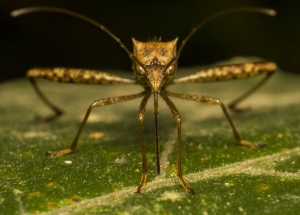All About DEET and Plastic: What's the Deal?
By on Sep 15 2017

I'm a little nuts about ticks right now, so I always make sure that I use bug spray with DEET when I'm heading out for a hike or deep woods home event.
The other day, I noticed some weird white spots on my yoga pants after I used some deep woods DEET and thought nothing of it until a friend said, Yeah, that DEET melts plastic. So, what's the deal?
The Makings of DEET

Let's start with the chemical name: N, N-Diethyl-meta-toluamide, also called diethyltoluamide and, as we know, DEET. It was developed by the U.S. Army in 1946 and has taken over for DDT, which was banned in the U.S. in 1972.
DEET doesn't actually kill the bugs you find so pesky. It creates a vapor barrier that fends off bugs and keeps them from landing on you. In the case of mosquitos, DEET messes with the sensors on their antennae and mount-parts that detect certain chemicals they are attracted to. This helps to keep them from landing and biting.
Certain brands make different formulas that can be used in various forms of the outdoors, and the higher percentage of DEET it contains determines the length of time you're protected. Make sure to read the label to ensure that it offers the protection you're looking for.
DEET works to deter bugs that carry harmful viruses, such as Lyme disease, in a way that other products can't.
How DEET Reacts with Plastic
So, back to my experience. First, I should say that I just sprayed the spray a little too close and it left little white dots nothing melted. However, if you're wearing clothing made from plastic materials, such as nylon, you could experience some chemical reactions.
As demonstrated with a plastic cup, DEET can melt plastic because it is a member of the tolune chemical categories, and these chemicals are solvents meaning they melt things, basically.
What's important to remember here is that you should be careful when applying DEET in relation to what's around you. Say you're having a party and using plastic cups. Well... don't spray your bug spray around the food, for one, but also be careful that overspray doesn't get on any plastic. This might include a watch, compass, your favorite pair of sunglasses, or a nylon-based pair of pants or shirt.
The more you know...

Recent studies and tests have determined that DEET does not have any negative effects on the health of humans, any species, or habitats. Still, it's advised that you always read the instructions of anything containing DEET to ensure proper and safe usage of the products.
Proper Application of DEET
Whenever you wear DEET, it's important to remember that you are working with a chemical, so proper application is necessary. The following information is always important to remember regarding safe application of bug spray:
- Wash any treated clothes before wearing then again.
- Do not apply too much a light dusting will get the job done.
- Apply for young children rather than letting them do it.
- Avoid application on irritated skin, cuts, or wounds.
- Avoid contact with eyes or mouth.
- Apply in well-ventilated areas.
- Do not apply under clothing.
- Don't spray the product on your face. Spray on your hands and carefully apply to your face, avoiding nose and mouth.
Always remember that everyone reacts differently to all skin products, so if you haven't used DEET before be sure to test it on a small section of your skin to ensure that you do not react negatively to it when the time comes for large-scale application and protection.
Armed with knowledge and these application tips, you're ready to face the outdoors with confidence!
Sources:
https://www.epa.gov/insect-repellents/deet https://off.com/en/education/active-ingredients/7-myths-and-facts-about-deet http://adventure.howstuffworks.com/outdoor-activities/hiking/deet.htm https://theboatgalley.com/deet-and-plastics/






